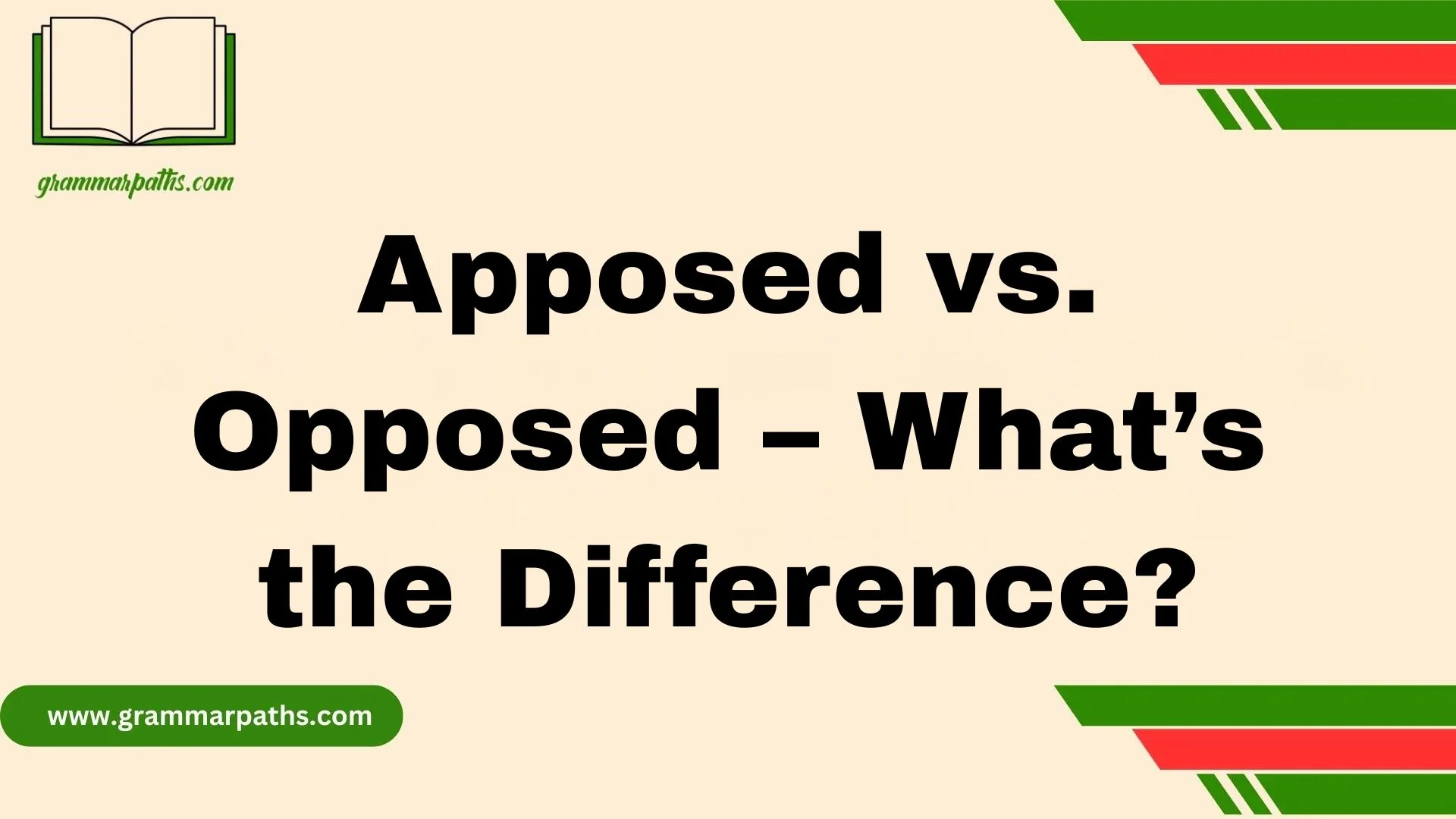They may look the same and even sound similar, but the meanings of apposed and opposed in everyday language are very different. In fact, this is where context plays a huge role — one wrong letter, a careless moment, and suddenly you’ve used the word that creates a confusing message for your readers. Apposed vs. Opposed – What’s the Difference? It’s a question that trips up even seasoned writers, editors, students, and professionals.
The term apposed is rarely seen outside biology or academic writing, where it refers to things being placed side by side or in close proximity — like flower petals or fingers pressed together. In contrast, opposed signals resistance, disagreement, or standing against ideas, creating conflict in thoughts, plans, or beliefs. I’ve heard even experienced linguists admit to mixing them up during casual or fast writing.
While teaching workshops, I’ve noticed how such subtle errors often get misused in essays, professional documents, or emails. And that tiny slip-up can seriously affect the clarity and accuracy of your writing, sometimes causing a full misunderstanding of the intended message or intent.
Why These Two Words Are So Confusing
Let’s face it—apposed and opposed look almost exactly the same. Just one letter sets them apart. To make things more confusing:
- They both come from Latin roots.
- They’re both past-tense verbs.
- They’re both pronounced similarly, especially in casual speech.
But here’s the thing: they mean totally different things.
- Opposed means you’re against something—you don’t agree, you resist it.
- Apposed means two things are placed side by side—it’s about physical closeness, not disagreement.
Apposed vs. Opposed — Quick Comparison
Here’s a side-by-side table to help you quickly understand how these two words differ:
| Feature | Apposed | Opposed |
| Part of speech | Verb (past participle) | Verb or adjective |
| Meaning | Placed next to or beside | Against or in conflict with |
| Common usage? | Rare, mostly scientific or academic | Very common in speech and writing |
| Used in conversation? | Almost never | All the time |
| Example sentence | “The leaves are apposed on the stem.” | “I’m opposed to that law.” |
What “Opposed” Really Means (And Why It’s Everywhere)
When you say someone is opposed to something, you’re saying they disagree or are against it. It’s all about conflict, resistance, or opinion.
Examples in Real Life
- Politics: “She’s opposed to tax increases.”
- Debates: “They were opposed in their views on climate change.”
- Everyday speech: “I’m not opposed to dessert first.”
Other Forms You’ll See
- Opposing: “The opposing team scored last-minute.”
- Opposition: “There was strong opposition to the new policy.”
- Oppositional: “He had an oppositional attitude in class.”
Opposed is your go-to word when there’s tension, disagreement, or two sides facing off.
You Hear It All the Time—Here’s Where
Chances are, you’ve already seen “opposed” today. It’s everywhere—news, social media, school, sports, politics.
In Headlines
“Voters Opposed New Measure by 68%” — The Washington Post
In Pop Culture
“Batman and Superman were opposed in the Justice League film.”
On Social Media
“I’m opposed to pineapple on pizza. Don’t @ me.”
In all of these, opposed is used to show conflict or resistance—one side vs. another.
Now Let’s Talk About “Apposed” (Yes, It’s a Real Word)
Here’s where things get interesting. Apposed is a legit English word, but most people never use it unless they work in science or medicine.
So what does apposed mean?
It means: to place two things next to each other, side by side, or in contact.
Real Examples
- In biology: “The cells are apposed along the membrane.”
- In architecture: “The columns are apposed to form symmetry.”
- In design: “The two surfaces are apposed to create a seal.”
Think of apposed like two puzzle pieces touching, not arguing.
Still Confused? Use This Analogy
Let’s break it down with a simple metaphor.
| Word | Think of it as… |
| Apposed | Two best friends sitting side by side |
| Opposed | Two fighters facing each other in a ring |
One means alignment, the other means conflict.
Appose = place beside. Oppose = stand against.
Common Mistakes People Make (And How to Avoid Them)
Example #1:
“I’m apposed to working weekends.”
This is wrong. You mean opposed, not apposed.
Example #2:
“The two panels are opposed to each other.”
Also wrong—unless you mean they’re fighting. If they’re just side by side, you want apposed.
Correct Use:
“I’m opposed to unfair policies.”
“The bones were apposed during surgery.”
Where “Apposed” Still Matters Today
Even though it’s rare in casual English, apposed plays a big role in scientific writing.
In Biology
- Apposed cells are touching each other.
- Apposed petals are arranged side by side.
In Medicine
- During surgery, wound edges are apposed to help healing.
- In MRIs, tissues may appear apposed when closely aligned.
In Engineering
- Apposed parts in machinery help create seals, joints, or symmetry.
If you’re in high school biology, college anatomy, or work in healthcare—you’ll need this word.
Opposed in the Real World
Unlike apposed, you’ll find opposed in almost every professional and personal setting.
At Work
- “Management is opposed to working remotely full-time.”
In Government
- “The Senator voted against the bill, stating she was strongly opposed.”
In School
- “The students were opposed to the new dress code policy.”
On Social Media
- “I’m not opposed to ketchup on mac and cheese, but I wouldn’t recommend it.”
This is everyday vocabulary. Knowing how to use opposed correctly will make you sound clear, confident, and sharp.
How to Remember the Difference (Without Mnemonics That Make No Sense)
Forget those boring textbook tricks. Here are some easy ways to remember which word to use.
Fast Tips
- Apposed has “pos” like position → things next to each other.
- Opposed has “opp” like opposite, opponent, or opinion → you’re against something.
Catchy Reminder
Appose = Align
Oppose = Opponent
Still confused? If you’re talking about conflict, it’s almost always opposed.
Grammar Tips: Using Each Word in a Sentence
Apposed
- Used only as a verb, usually in passive form.
- Only shows up in technical writing.
“The tissues were carefully apposed during the procedure.”
Opposed
- Used as both a verb and adjective.
- Very common in everyday and formal English.
“She opposed the decision.” (verb)
“He was opposed to the rule.” (adjective)
| Form | Correct Use |
| Verb | “The citizens opposed the new law.” |
| Adjective | “They are opposed to changing the plan.” |
| Apposed (verb) | “The parts were apposed in assembly.” |
Let’s Practice: Fix These Sentences
Can you spot the errors? Check yourself:
- “The bones were opposed during surgery.”
- “He was apposed to wearing a tie.”
- “The ideas were apposed in the debate.”
Corrected
- ❌ → The bones were apposed during surgery.
- ❌ → He was opposed to wearing a tie.
- ❌ → The ideas were opposed in the debate.
Why This Matters in Real Life (Yes, Even to Teens and Professionals)
Knowing the difference between apposed and opposed isn’t just a grammar flex. It affects:
- How professional your emails and essays sound
- How well you express disagreement or support
- Whether your point comes across clearly
Case Study: Resume Mistake
A college student wrote: “I’m apposed to unethical work environments.”
The recruiter flagged it as a spelling error—and questioned the student’s attention to detail. It should have been opposed.
In competitive environments like school, job interviews, or social platforms—using the wrong word hurts your credibility.
Key Takeaways: Apposed vs. Opposed
Here’s the summary that ties it all together.
| Word | Meaning | When to Use It |
| Apposed | Side by side, physically aligned | In science, medicine, or design |
| Opposed | Against, in conflict with | Everyday speech, debates, writing |
If you’re talking about conflict—go with opposed.
If you’re describing two things placed side-by-side—choose apposed.
Conclusion:
Choosing between apposed and opposed may seem like a small detail, but that one-word difference can have a big impact on the clarity, accuracy, and overall message of your writing. Whether you’re a student, editor, or professional, being aware of how these words function in context ensures your writing is both thoughtful and confident. While apposed refers to things being placed side by side, opposed emphasizes resistance or disagreement. Understanding and mastering these terms helps prevent confusing mistakes that can affect your reader’s understanding.
FAQs
Q1: Is “apposed” commonly used in writing?
A: No, apposed is not common in everyday writing. It is mostly used in academic, scientific, or biological contexts where objects are described as placed close together.
Q2: Can I use “opposed” when referring to physical positioning?
A: No. Use apposed for physical placement like petals or fingers together. Opposed should be used when expressing disagreement or being against something.
Q3: Why do people confuse apposed with opposed?
A: Because they look and sound similar and both are legitimate English words, it’s easy to mix them up, especially in fast or casual writing.
Q4: What’s a quick way to remember the difference?
A: Think of “appose” like “approach” — things coming together. Think of “oppose” like “opposite” — pushing against.
Q5: Does using the wrong word affect the sentence a lot?
A: Yes. It can lead to confusion, misunderstanding, and make your writing appear less accurate or professional.
Helpful Resources
- Merriam-Webster Dictionary – Opposed
- Cambridge Dictionary – Apposed
- Grammarly – Commonly Confused Words
- National Institutes of Health – Apposed Tissue Study

Grace Marie is the dedicated writer behind GrammarPaths.com, where she shares her passion for English grammar, idioms, and writing mastery. With a strong background in language studies and years of experience helping learners improve their communication skills, Grace creates clear, practical, and engaging content that makes English easy to understand.












